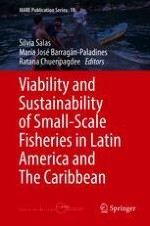2019 | OriginalPaper | Buchkapitel
15. Seafood Supply Chain Structure of the Fishing Industry of Yucatan, Mexico
verfasst von : Carmen Pedroza-Gutiérrez
Erschienen in: Viability and Sustainability of Small-Scale Fisheries in Latin America and The Caribbean
Aktivieren Sie unsere intelligente Suche, um passende Fachinhalte oder Patente zu finden.
Wählen Sie Textabschnitte aus um mit Künstlicher Intelligenz passenden Patente zu finden. powered by
Markieren Sie Textabschnitte, um KI-gestützt weitere passende Inhalte zu finden. powered by
